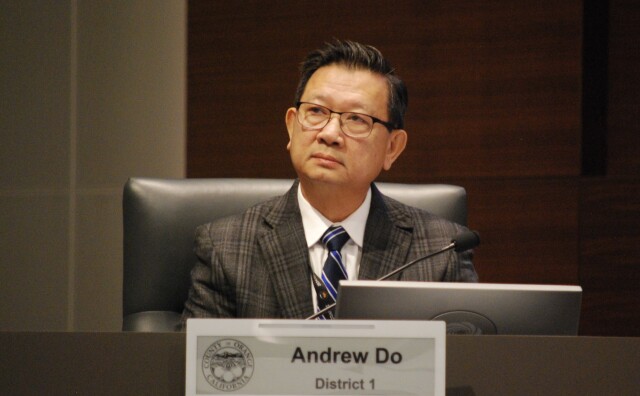Proposition 34 would limit how certain healthcare organizations spend the money they make from a federal discount drug program. But at its core, the initiative pits the state's rental housing industry against the L.A.-based AIDS Healthcare Foundation, which has a history of backing rent control initiatives, including one on the Nov. 5 ballot. It has been dubbed by opponents as a "revenge initiative." (Much more on this all below.)
Prop. 34 would make certain health organizations spend 98% of their net revenue from the federal discount drug program on “direct patient care.” That program, known as 340B, has allowed healthcare organizations who serve vulnerable and low-income patients to buy drugs at a discounted price and then sell at a market rate. The intent is they can use the profit to serve more patients in need.
What does all of this have to do with rent control? Keep reading.
Official title on the ballot: Proposition 34 — Restricts Spending of Prescription Drug Revenues by Certain Health Care Providers. Initiative Statute
You are being asked: Should Proposition 34 require certain healthcare providers to spend 98% of revenues from federal discount prescription drug program on direct patient care, and authorize statewide negotiation of Medi-Cal drug prices?
-
A "yes" vote means: Certain health care entities would have to follow new rules about how they spend revenue they earn from a federal drug discount program. Breaking these rules would result in penalties (such as not being able to operate as a health care entity), generally for a 10-year period.
-
A "no" vote means: These new rules would not go into effect.
Understanding Prop. 34
The restrictions wouldn’t apply to all healthcare entities.
The healthcare organization would need to have spent more than $100 million on things other than direct patient care in the last decade — and own and operate multifamily housing units “with at least 500 high-level violations.”
Make It Make Sense: Election 2024 Edition
So far, only one group appears to match that description: The AIDS Healthcare Foundation, which operates HIV clinics and thrift stores across the country.
The proposition would also codify the way the state buys drugs by having state agencies negotiate as a single entity for better prices.
-
City of Los Angeles
- City Council: Vote for districts 2, 10 and 14.
- Charter Amendment ER: A package of ethics reforms designed to fight corruption at City Hall. Plus: Charter Amendments DD, FF, HH and II.
L.A. County
- Board of Supervisors: Measure G would dramatically overhaul county government.
- District Attorney: Criminal justice reform, or more law-and-order justice?
- LA Unified school board: Voters are also deciding on a $9 billion facilities bond and a redistricting measure.
- School district measures: Schools have a lot of repair needs.
- Superior Court judges: Plus: Tips to make sure you're putting right person on the bench.
Statewide races
- Whoa! There are 10 propositions on the ballot. Here's your cheat sheet to Props. 2, 3, 4, 5, 6, 32, 33, 34, 35 and 36.
Jump to the full Voter Game Plan for dozens more races ▶
The history behind it
So why is such a highly-targeted proposition even on the ballot? It comes down to this:
The AIDS Healthcare Foundation has funded a number of ballot measures on rent control in recent years (including Prop. 33 this year). They backed similar efforts in 2018 and 2020 that failed. The nonprofit’s founder and president, Michael Weinstein, has been a controversial political figure who’s built the organization into a $2 billion operation. The organization also provides housing and has been subject of an L.A. Times investigation about its properties’ poor living conditions.
Housing interest groups have opposed the AHF rent control ballot measures, and are now the main financial backers of Prop. 34.
How it would work
The proposition would create new rules for how a healthcare entity that participates in the 340B program can spend its revenues. If they spend less than 98% of their net revenue from the program on “direct” patient care, the organizations would essentially lose their ability to operate. Specifically, the organization would lose its license and its nonprofit status, would be barred from state and local government contracts or grants, and its leaders would not be able to serve in leadership roles in a California health plan, pharmacy, or clinic.
Cram session
During AirTalk's Ballot Cram Session live event, Larry Mantle talked with Caltech's Michael Alvarez, Pomona College's Sara Sadhwani and Claremont McKenna College's Zachary Courser about Proposition 34.
What people who support it say
Supporters say the measure is about accountability on revenue made off of a federal drug discount program. “That money should not be used for political purposes. It shouldn't be used for anything other than healthcare services,” said Nathan Click, spokesperson for Yes On Prop 34, which is sponsored by the California Apartment Association, and includes groups like the ALS Association and San Francisco Women’s Cancer Network. They’ve called Weinstein a “safety net scammer” and say the measure would put guardrails on the way revenue from the 340B program is spent and prevent future abuses.
What people who oppose it say
Opponents call this measure a “revenge initiative” targeted at the AIDS Healthcare Foundation’s efforts on rent control measures. “This is just clearly these corporate billionaire landlords putting an initiative on the ballot to stop a nonprofit that works on behalf of tenants, that works in advocacy for tenants, and is trying to expand rent control,” said Susie Shannon, policy director for Housing as a Human Right. They say their lobbying efforts are important to serving their patients because housing stability helps people stay healthy and prevents the spread of HIV. Opponents include Consumer Watchdog, and the National Organization for Women, who said the measure could have a ripple effect on nonprofit advocacy.
Potential financial impact
According to the California Legislative Analyst’s Office, “because few entities would be affected, the proposition’s statewide fiscal effect … would be limited.” It would increase state enforcement costs, but that would be paid by new fees on the affected entities.
Listen in as AirTalk tackles Prop. 34
Follow the money
Before you read more, we wanted to take a moment to tell you about our mission here at LAist, and why we're so dedicated to helping you get ready to vote.
In the lead-up to this important election, our hard-working reporters and editors spent hundreds and hundreds of hours researching and writing these detailed guides and fact-based resources. We invested that time because we're here to help you vote confidently and make your community a better place.
But we cannot do this essential work without your help. We rely on donations from readers like you to stay independent, which keeps our nonprofit newsroom strong and accountable to you.
At a time when the need for local journalism has never been greater, many newsrooms are facing cutbacks, including LAist. Member support — your support — is what will sustain a free press in Southern California.
LAist’s mission is to be here for you, so please be here for us now with a donation to power our trusted local reporting. Step up right now and make the choice to give. Because that’s exactly what it is — a choice. It's choice with consequences. If readers do not choose to step up and donate, the future of fact-based news in Southern California will not be as strong.
No matter what happens in the world, LAist will remain a voice you know and trust.
Thank you for your generous support.
Sincerely,
-
(she/her)









